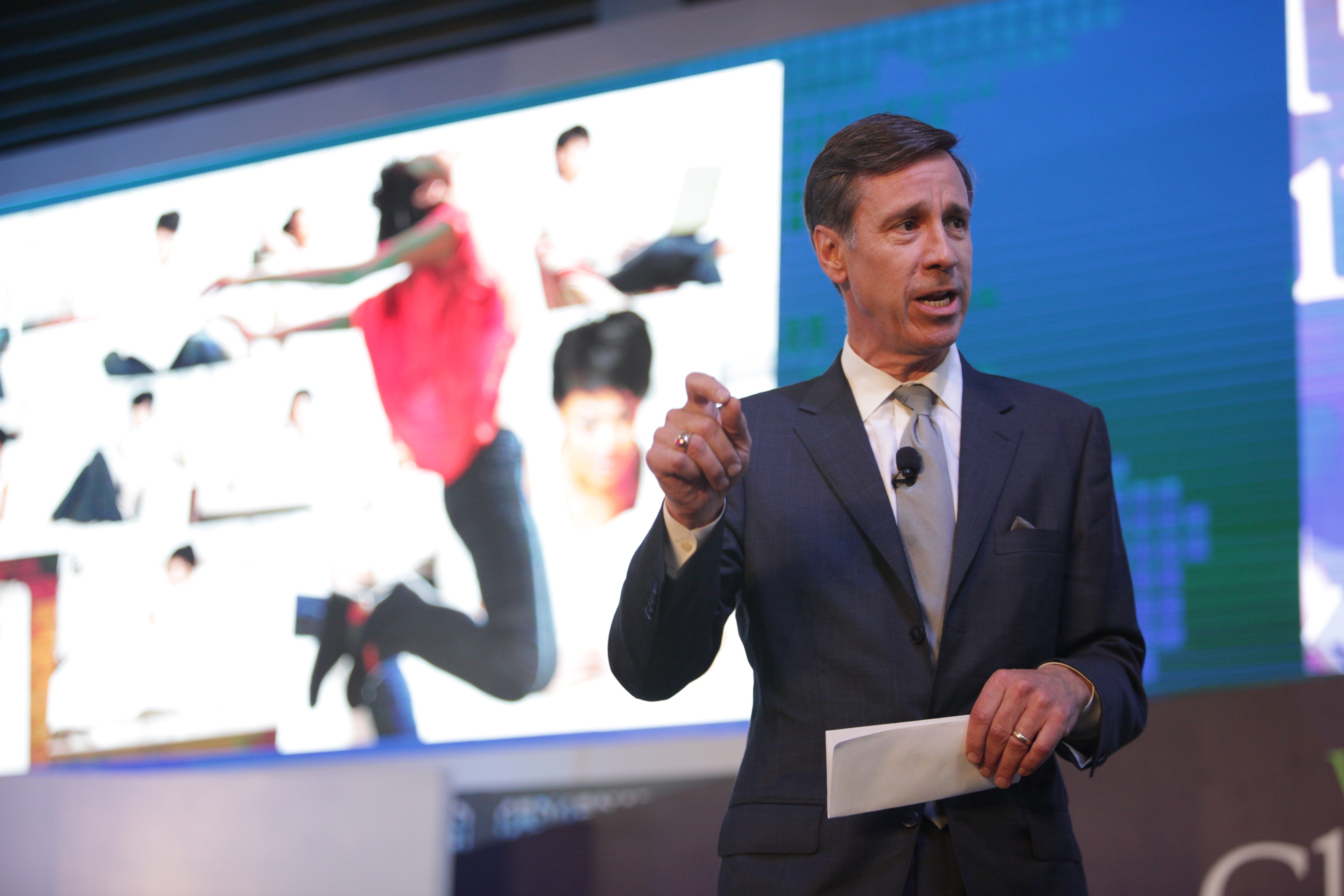Arne Sorenson is the first non-family-member to run Marriott International, the largest publicly traded hotel chain in the world.
He became president and CEO in March 2012 and led the company through a $13 billion acquisition of Starwood Hotels & Resorts in 2016. The company now owns 30 hotel brands with 1.2 million rooms globally that are available to book.
In 2017, Marriott plans to open 500 new hotels. Sorenson spends about 200 days a year traveling and visiting Marriott locations.
Sorenson sat down with Business Insider at the World Economic Forum in Davos, Switzerland, and revealed how he plans to compete with Airbnb and win back millennials, and what his best travel hacks are. He also had a few words for President Donald Trump.
The following interview has been lightly edited for length and clarity. The full interview is here.
Alyson Shontell: You had an eventful 2016, starting with a $13 billion purchase of Starwood Hotels. How has it been, merging the companies?
Arne Sorenson: It was fascinating. We announced the transaction in November 2015. We got into 2016 hoping to get to shareholder votes and get to closing and do all the integration work.
We had a Chinese bidder that surfaced in March, so we went through another round of bidding. Of course, the approval process ended up taking longer. So we didn't close until September.
We're now about four months into it, and there's an enormous amount of work to do. We're focused on our three communities. Those are the hotel guests, the associates that work for the company - there are about 650,000 people who wear our hotel badge every day - and our hotel owners.
Our business model is to manage for real-estate investors. They want to make sure this is good for their investment. So there's a lot of work to do, but so far so good.
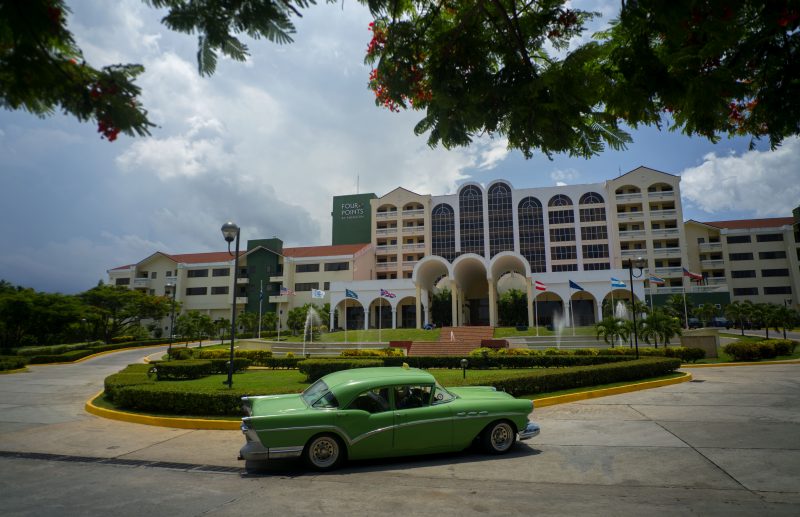
Shontell: Another thing you did last year was travel to Cuba with President Obama. Tell me about that experience.
Sorenson: It's always great to be anywhere near the president. And it was fun to be in Cuba and to watch that whole thing unfold. I had been there once before. Cuba itself is a fascinating destination, particularly for Americans.
The relationship between the US and Cuba has been so complicated for so many years that I think many people are intrigued by this island which is so close to Florida, and they really want to go and see it.
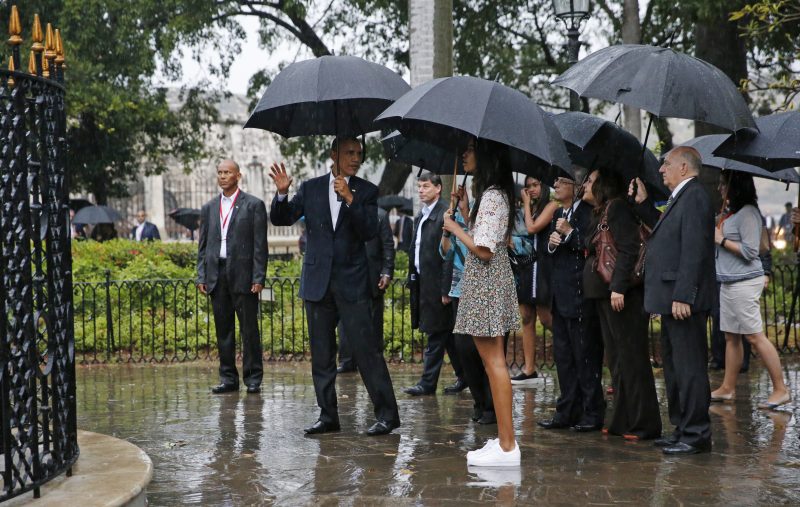
That history makes the transition difficult politically and made it interesting economically to watch President Obama there with the Cuban government, trying to get to know each other and explore the way the relationship is going to work between the two countries.
We've already opened one hotel in Cuba, Four Points by Sheraton, and we expect we will open another one in early 2017. We're talking about another handful of hotels in Cuba after that.
Shontell: How has tourism to your hotel in Cuba been so far?
Sorenson: It's been great. There are not enough hotel rooms in Cuba to meet the demand.
Shontell: After the election, you wrote Donald Trump a letter. What inspired you to write it, and did he ever get in touch afterward?
Sorenson: One, I like to write. I had an hour on a flight one week after the election, and I was thinking about what was on my mind.
On some level, I wanted to share the thinking that I had about what I would do if I were him. Listening to what happened during the election, thinking about who his voters were, thinking about the kind of comments he made.
I wanted to address some of the things that were important to him but also important to us. Part of that is about the people who work for Marriott - 650,000 globally. They are keenly interested in the election and the outcome, and they worry about what the policies will mean for them. To some extent, I can be their voice.
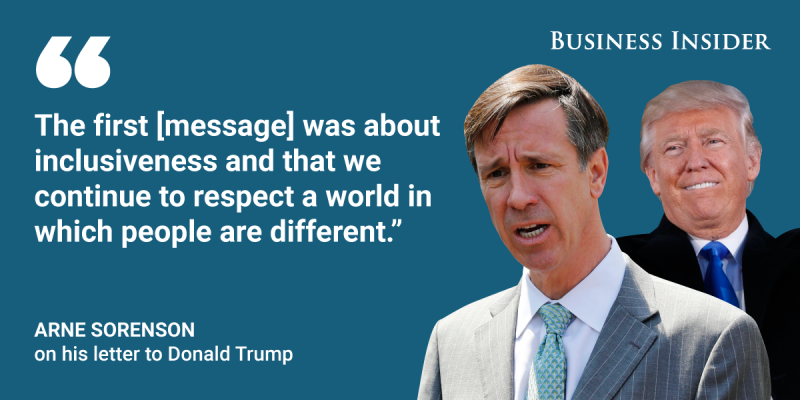
I don't know Trump. I've never met Trump. And I can't tell you for certain whether he's read the letter or not. The letter did get read quite broadly.
There were a few messages in it. The first was about inclusiveness and that we continue to respect a world in which people are different. People are leading different lives, they're from different places, and all of them have worth and value. We have a diverse collection of associates, and we check in people from all around the world, so that's really part of our DNA.
Then [I included] some things around travel, policy, and tax reform.
Shontell: Let's discuss some of today's travel trends. Airbnb is an about $19 billion Marriott rival. Millennials like that they can go to a new place and feel like a local. How are you dealing with that shift, and how do you win millennials back?
Sorenson: Airbnb has grown quickly. ... So far, the impact of Airbnb has not been profound to our business. I won't say it's been zero because in some markets there is probably an impact. But it has not been as significant as you might think, given how quickly it has grown.
In many respects, they are selling a different product. At least in the first phase of its business, it was different. It was home sharing - literally an extra bedroom or an extra couch.
The other thing it offers, which is attractive to many, is it can be cheaper. So partly it's the shared economy and the different experience, and partly it's a pure cost issue. Both are areas where we need to compete.
We have never been the cheapest room in a market. We don't aspire to be. So how do you not be the cheapest? That's around product quality, service, and location, and we'll continue to do those things.
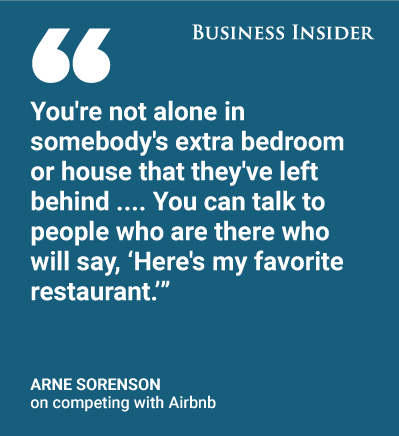
When it gets to experiences in the shared economy, we have already been doing stuff in that space where, through a concierge, we help arrange local experiences. We have advantages because we have a community [at our hotels]. You're not alone in somebody's extra bedroom or house that they've left behind. You're around folks you can see in the lobby or at the bar or restaurant. You can talk to people who are there who will say, "Here's my favorite restaurant," or "What kind of restaurant do you want to go to?" "Here's the favorite hike I would encourage you to take." So I think we can compete extremely well.
Shontell: Have you ever tried to buy Airbnb?
Sorenson: No, we haven't. People certainly have asked, "Why didn't you start Airbnb?" or a version of that. Maybe we should have. But on one level, the answer is simple: In many markets, the business they've done is illegal.
It's one thing for a startup to enter that space. It's another thing for an established company that intends to comply with laws to come in and start a venture that actually doesn't comply. I think the cities would respond differently to an established company like Marriott than they would to a startup.
Shontell: You're on the road about 200 days a year. What tips do you have for traveling like a pro?
Sorenson: I've got lots of tricks. I never check a bag. I still read paper, which is a bit of an unusual thing, although some of the news I get by tablet. But an awful lot of the books I read - and I read a lot - I carry paper. So I've got a full briefcase and a wheelie soft-sided bag that I carry as my suitcase when I'm gone for a week or two.
I have different routines around sleep on flights depending on where I'm going. If I'm going to Europe, which is typically an overnight flight, I'll have a bite to eat and then immediately go to sleep. When I go to Asia, typically you're landing at night time. I try to stay awake the full 13- or 14-hour flight over so that by the time I get there, I'm exhausted enough to get a great night's sleep.
Exercise is hugely important, particularly when you travel. I will hit the gym or run outside. Running is what I've always done. It's also the quickest, and you need the least gear for it.
I love to first open all the curtains in the hotel room when I walk in, including at night and in cities. Getting the natural light, particularly when you're in a different time zone, is really important, as is getting immediately on that schedule as opposed to giving into the exhaustion.
Shontell: What are little-known secrets about hotels? Any tips for getting upgrades or freebies?
Sorenson: They're not secrets, but the loyalty programs are huge. We've got Marriott Rewards and SPG. When we closed the transaction, we allowed customers to link their accounts and have their elite status matched between the two and trade points from one program to the other.
If you're in the loyalty program, you're going to pay no more and - in many instances - less for your room than you would pay through any other channel. You'll get free Wi-Fi, room upgrades, and other benefits.
It costs nothing to join a loyalty program. And it is the best way, on a regular basis, to be treated as well as you can be treated.
Shontell: So there's no code word you can say that will trigger an upgrade?
Sorenson: There's no code word. But I think a lot of our loyalty members like to still check in at the front desk because they're hoping they haven't heard about an upgrade before they've gotten there or there will be a suite that didn't sell that night.
It's always useful to be kind. We want our people to be kind to all our guests. But human beings are creatures of human nature, and we all respond better to a smile than to anything else. Friendliness at the front desk is always a useful thing for a guest.
Shontell: Let's move on to plans for the future for Marriott. What does 2017 look like for you?
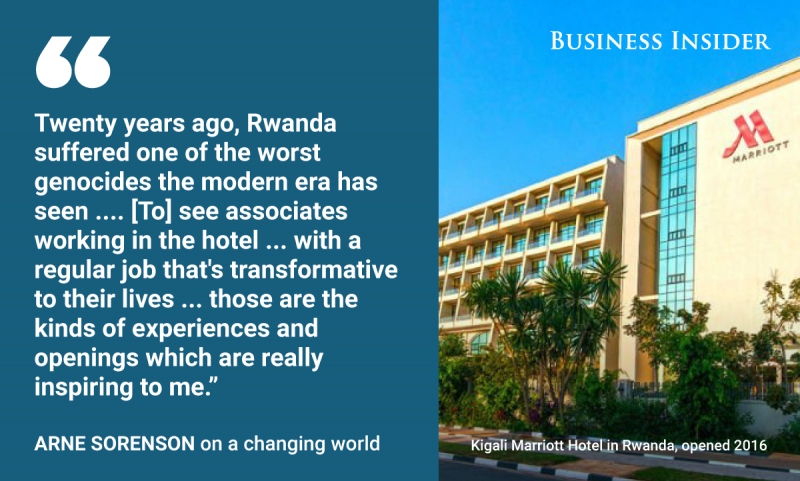
Sorenson: We have about 1.2 million hotel rooms open and about 425,000 in development. In 2017, we will open close to 500 hotels - so more than one a day around the world.
Every new hotel opening is an exciting time because there are new jobs that get created with a new virtual community.
We also have to make sure we make good progress on the Starwood and Marriott integration. That's about technology, approaches we take to business, and our leadership teams around the world.
Beyond that, the intersection of technology and travel [will be a focus]. That's going to be around helping customers use technology which is intuitive and simple to plan and share their trips.
Shontell: Of all the 500 hotels opening, which are you most excited about? Which one should we be clamoring to check out?
Sorenson: We opened a Marriott in Rwanda late in 2016. It's the first hotel of any of our brands we have there.
Twenty years ago, Rwanda suffered one of the worst genocides the modern era has seen. One million people were killed in 90 days. To go to a place like that and see associates working in the hotel, virtually all of whom had been impacted by that event, with a regular job that's transformative to their lives, and with an optimism about welcoming people to Rwanda - those are the kinds of experiences and openings which are really inspiring to me.
Shontell: Is there a destination in America, and even globally, that's really hot right now?
Sorenson: Cuba for Americans is a really appealing destination. It obviously has warm weather, but people want to see Havana, and they want to see the architecture.
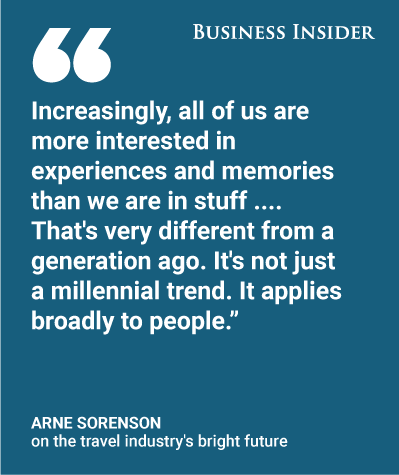
The Chinese are increasingly drawn to Japan - to Tokyo, to Kyoto, and to a number of the different markets. Japan is beautiful, it's close for them, and the food is exquisite. So you see the visits from China to Japan increasing very, very significantly.
We shouldn't forget that there are some global destinations that are extraordinarily attractive: Paris, London, New York, San Francisco, Rio. These are cities that people all around the world have heard of, and they want to go to those places.
Shontell: Looking beyond 2017, what will the future of travel look like?
Sorenson: The numbers that are top of mind for me: There were about 1.2 billion international trips last year. We think that will grow to 2 billion in the next decade or so. Our estimates are that a job will be created for every 30 trips. That's 25 [million] to 30 million new jobs in the travel growth space alone.
There are some trends that drive this that are powerful. Increasingly, all of us are more interested in experiences and memories than we are in stuff. People say, "It's really important to take that vacation and spend time with family and friends, and I'm going to prioritize that over buying a car." That's very different from a generation ago. It's not just a millennial trend; it applies broadly to people.
Another trend is the growth in the global traveling class, or the global middle class. You've got many, many more people who have the resources to travel and want to travel.
When you put those two things together, and I think the future is really bright.

